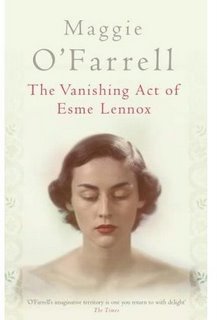
This half of BrontëBlog is a true admirer of Maggie O'Farrell, and has been ever since her first book,
After You'd Gone (completely unrelated to this blog's main topic I would like to entreat anyone out there to grab this wonderful book and read it - you seriously won't regret it).
Last week I was lucky enough to get a copy of Ms O'Farrell's new book
The Vanishing Act of Esme Lennox, - due out on August 28, published by Hodder Headline in the UK - beforehand. Since that, I have only had time to read a few pages into it, but imagine my surprise to see it linked to the Brontës and particularly to Bertha Rochester in a review from
The Scotsman. It is true the main theme of the book appears to be madness and how and according to what it is defined.
This is the story behind the Victorian madwoman in the attic, of all the forgotten women whose rewritten histories replace isolation with hysteria, and non-conformity with insanity. This is not to say that it reads as a politically charged feminist indictment. Like Jean Rhys's Wide Sargasso Sea - which gives a voice to Bertha, the first Mrs Rochester in Jane Eyre - all this is reflected through one woman's tragic tale. (...)Women's 'madness' may seem like ground well-trodden - from Sylvia Plath's The Bell Jar to Rhys's novel, as well as, more recently, the study of the housebound wife in Michel Faber's The Crimson Petal and the White - but it's a disturbing subject worth revisiting and one which continues to resonate. (CHITRA RAMASWAMY, reviewer)
I am told that the review contains spoilers so if you plan on reading the book, just keep the link until you are done with it.
If you are around Edinburgh next Friday August 25, you might get a chance to hear / ask more about this Brontë connection at the
Edinburgh International Book Festival, where Maggie O'Farrell will be making an appearance at the Scottishpower Studio Theatre at 7pm.
Categories: Books









0 comments:
Post a Comment